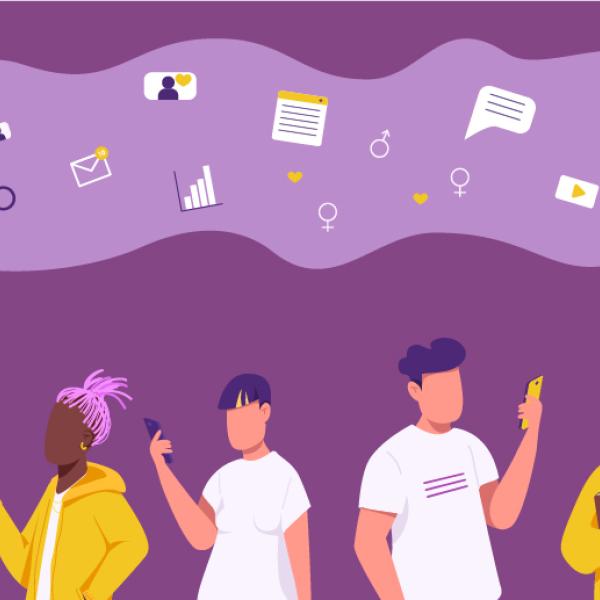Rita Orji grew up in a remote village without electricity or pipe-borne water in Enugu State in southeastern Nigeria. Her curiosity and technical skills was evident from a young age. She loved to take things like bicycles or radios apart, then put them back together. She excelled at mathematics in grade school, then was admitted to study computer sciences at Nnamdi Azikiwe University without ever having used a computer. Orji soared to the top of her class, staying there until graduation, while engaging in student politics and other extra-curricular activities. The upward trajectory continued, as she attained a PhD from the University of Saskatchewan as a Vanier scholar, followed by post-doc fellowships at McGill, Waterloo (where she was also a Banting Postdoctoral Fellow) and Yale universities.
Orji is now an associate professor in the Faculty of Computer Science at Dalhousie University, a Canada Research Chair in Persuasive Technology and a researcher in the Human-Computer Interaction, Visualization and Graphics group and director of the Persuasive Computing Lab.
With CFI-funded equipment, she explores how to design persuasive technologies such as personalized mobile apps and games that motivate positive behaviours in users to support health and wellness. We talked to her to find out how working at the intersection of human behaviour and computer science motivates her.
|

Rita Orji explores the dynamic field of persuasive technology, developing interactive digital systems that motivate healthy behaviours.
|
CFI: What motivated you to pursue research into persuasive technology?
Orji: I am naturally passionate about finding solutions to problems in my environment and helping people. My research in persuasive technology provides me the opportunity to do just that — design technologies that empower people and contribute to solving a myriad of problems in society.
CFI: Are you developing apps or games to help people cope with COVID-19?
Orji: With my Dalhousie U psychiatric collaborator, Sandra Meier, I’m monitoring the mental health effects of COVID-19 isolation and lockdown using a mobile application we designed.
We are asking questions like: How is the lock down and social isolation affecting people’s mental health? You can’t meet your friends, but are you able to do other things? Through their mobile phone, the app senses what people are doing and how they’re coping, including their physical activity and social interaction with others.
Eventually, this data can be used to predict peoples’ mental states and mental health outcomes. We can then recommend things people can do to compensate.
We also designed games that simulate how COVID-19 spreads and teaches people about precautionary measures for COVID-19, such as hand washing, social distancing and wearing a mask, which helps them understand the danger of breaking one of those protocols.
CFI: Having a motivational app that reminds us to breathe or exercise has become familiar to many of us. What is unique about the kinds of persuasive computing you’re working on?
Orji: We employ the human-centred design approach to personalize these technologies. For example, we can program an app to understand what triggers your anxiety. Maybe it’s a call from a particular friend, maybe it’s news from somewhere, maybe it’s social anxiety. The app knows that if the heart rate has increased or blood pressure is high or body temperature has gone up, that something is wrong. Using the power of artificial intelligence, it learns about each individual and creates a profile for each person that includes the possible remedies that work for each individual. For some people, listening to music, exercising, meditating, or dancing may work for them while it may not work for others. There’s no one solution that works for everybody. The app might suggest something as small as getting up for a walk, taking a deep breath or calling a friend. But it’s not random. It’s based on what the app has learned over time about what works for that individual. It also takes into account unique characteristics such as personality type, culture and age.
CFI: Tell us about the persuasive tech you’ve developed to promote sexual health in Africa.
Orji: In Africa, talking about sex in public is still considered a taboo. You don’t learn about it in school, so young people don’t have adequate knowledge on how to be safe or avoid risky sexual behaviour. We designed a free online app for discouraging risky sexual behaviour. Many people in Africa have mobile phones and youth, who we’re targeting, play online games. The game we designed has different levels that teach them about different sexually transmitted diseases like HIV, how it’s contracted, how to avoid it, the symptoms and how to get tested. They’re having fun while learning. It’s also private, which is very important to avoid stigmatization.
CFI: In your native country, you created the Education for Women and the Less Privileged to motivate youths to pursue higher education. What led you to undertake this kind of project?

Orji: Education is an equalizer. Being the first woman to earn a PhD from my native town of over 50,000 people, I want to remove barriers against women education and empower them to pursue higher education as opposed to just doing menial jobs, getting married, and that’s the extent of life, using myself as an example. I am the type that wants to get involved in my community to help people and make society better. My story changed the negative narratives against women’s education in my native home. Educated women are now celebrated and everybody uses me as an example to motivate their kids.
CFI: Aside from developing new technologies, what else are you working toward?
Orji: I want to mentor more young people to make an impact in the world. I’m passionate about training diversity in STEM [science, technology, engineering and math]. I want to see underrepresented women, Indigenous peoples and those of colour get involved in developing our world through computing and other STEM careers. I want to show them that they can climb, grow and contribute meaningfully.







